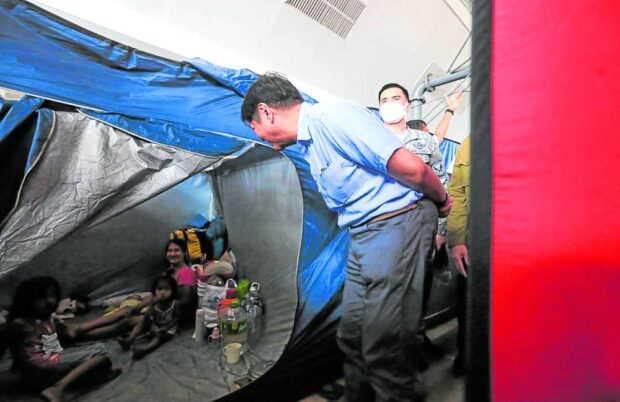Marcos visits Mayon evacuees; work program set at shelters

AID ASSURED | President Marcos visits Mayon evacuees at Mauraro in Guinobatan, Albay province, on Wednesday, June 14, 2023. He particularly ordered the setup of more water treatment machines for the families. (Photo by MARK ALVIC ESPLANA / Inquirer Southern Luzon)
GUINOBATAN, Albay, Philippines — A few days after villagers within the danger zone around Mayon Volcano were ordered to evacuate, President Ferdinand Marcos Jr. arrived here on Wednesday to check on their condition and personally hand out food packs.
But the families displaced by the volcano’s renewed activity said they would prefer cash and livelihood assistance, saying their children needed food more nutritious than instant noodles, the usual grocery item found in the aid rations.
“The evacuees receive sufficient food [among the] relief goods but our children cannot survive with just noodles for breakfast every day. We really need cash [to buy food ourselves],” Rayson Mayor, 36, a resident of Mi-isi in Daraga town who was forced to flee and move to Barangay Anislag, said in a phone interview on Wednesday.
At around 4 p.m., Marcos arrived in Albay together with United Arab Emirates (UAE) Ambassador Mohamed Obaid and went straight to the evacuation center at Guinobatan Community College.
The UAE has donated some 55 tons of relief goods, with packs containing Basmati, tea, and flour coming from India; canned tuna from Thailand; dates from Saudi Arabia; cooking oil, pasta, sugar, milk, tomato paste, powdered milk, and beans.
Article continues after this advertisementThe president later proceeded to Albay Astrodome in Legazpi City for the launch of an emergency employment program for the evacuees under the Department of Labor and Employment (DOLE).
Article continues after this advertisementMa. Zenaida Campita, director of Dole’s regional office in Bicol, said the agency had allocated about P50 million for the program.
Evacuees willing to work would be paid to keep the evacuation centers clean, particularly the kitchen and the toilets; to do some gardening, and to help camp managers in preparing food.
Under the program, there will be one representative per family who can work and earn P365 per day for 30 days. “Afterwards, even if they have already returned to their homes, we can still help them in their livelihood,” Campita said.
Common kitchen
In a speech at Albay Astrodome, the president said he would order the Metropolitan Manila Development Authority to send 80 more water filtration machines for the evacuees, and the Department of Health to closely monitor their condition.
Norman Laurio, the director of the Department of Social Welfare and Development in Bicol, said her office had asked other local governments for help to provide a wider variety of food for the evacuees, as well as set up “common kitchens so that the families could cook their own meals.”
Beneficiaries of the DSWD’s Pantawid Pamilyang Pilipino Program (4Ps) in Barangay Sta. Cruz in Ligao City have also set up a “community pantry” at Basag Campsite where some Mayon evacuees are staying.
Jean Cambusa, 48, said she and 10 other 4Ps recipients in her village agreed to donate fruits and vegetables harvested from their own backyard, like jackfruit, papaya, and malunggay, among others.
“I also want to help because I know how it feels to be in an evacuation center. [Once] there was a typhoon that hit us and we had no food and water inside the evacuation centers,” Cambusa said.
Store in evacuation centers
Hugo Buen, chief of the Tabaco City Disaster Risk Reduction and Management Office, said some of the evacuated families continue to weave abaca products and brought their sari-sari store items to sell inside the evacuation centers.
“Some of them asked for space in the evacuation center that will serve as a stockroom for their raw materials,” Buen said.
According to Eugene Escobar of the Albay Public Safety and Emergency Management Office, most of the affected villagers were farmers, but the provincial and national government would later try to teach them other livelihood skills.
The province has a current stockpile of relief items that could meet the needs of the evacuees for 40 to 45 days, Escobar added.
As of Wednesday noon, 5,016 families or 17,94 persons were staying in 30 evacuation centers and private households in Ligao City, Tabaco City, Daraga, Camalig, Santo Domingo, Malilipot, and Guinobatan.